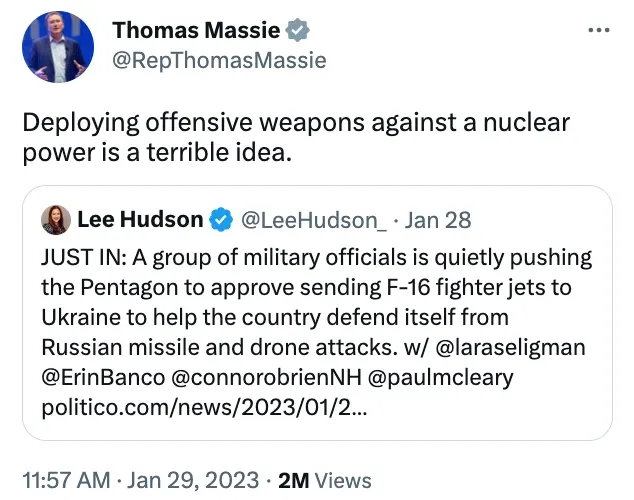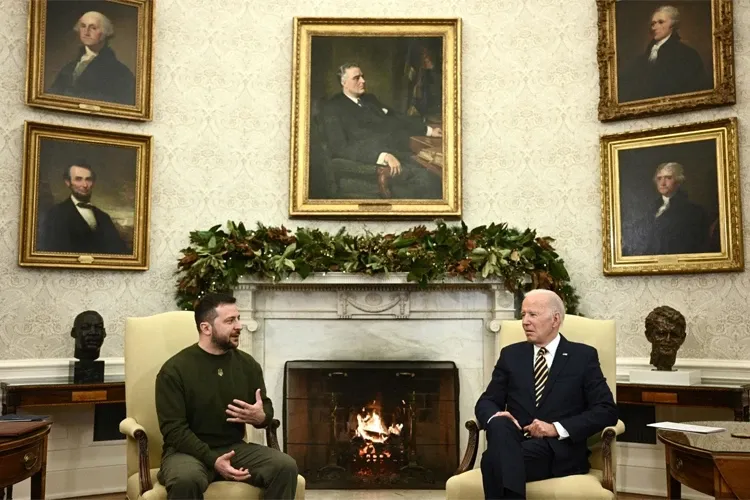On February 20, Joe Biden made a historic visit to Ukraine to show the US’s solidarity with it as it staves off a brutal Russian invasion that is about to enter its second year.
Biden’s visit marked the first time in modern history a US president has entered a conflict zone without an active American military presence. Taken with his pledge for an additional $460 million in aid, the Biden administration is reinforcing an undeniable message to the world: the US firmly stands with Volodomyr Zelenskyy’s government.
The primary question is now one of priorities. At what point has the federal government gone too far in support for a foreign nation facing an admittedly wicked attack from a third foreign entity?
The Biden administration has been previously pressured to send more lethal military aid to Ukraine such as F-16 planes. The Biden administration correctly rejected such a request out of fear this weapon delivery would unnecessarily escalate the conflict. However, they capitulated to some of this pressure in late January, announcing the deployment of 31 Abrams tanks.
Some calculations place the total aid to Ukraine at over $113 billion, and the American public is gradually growing tired of the ballooning numbers. In May 2022, three months into Russia’s military incursion into Ukraine, 60% of Americans were in favor of sending weapons to Ukraine. However, as of January, that level of support dipped to 48% per a recently published Associated Press-NORC Center for Public Affairs Research poll.
The American people are beginning to manifest the right instincts here. They understand that supplying more weapons to Ukraine will only escalate tensions with Russia — a regional power with a vast nuclear arsenal. The political class in DC has failed to grasp this. The DC foreign policy establishment has grown accustomed to the US pushing around backwaters such as Afghanistan, Iraq, Libya, and Syria. However, when it comes to dealing with Russia it’s a whole different ballgame.
Rep. Thomas Massie (R-KY) is one of the select representatives who grasps the risks of trying to dial up pressure against Russia in this geopolitical struggle. Before Biden announced his decision to not send F-16s to Ukraine, Massie tweeted:
Deploying offensive weapons against a nuclear power is a terrible idea.

Sooner or later, Biden’s unwavering support will begin to look like an unthinking impulse to choose war with Russia in any event. That is a dangerous geopolitical game in anyone’s book.
The good news is that elected officials such as Massie are still active in Congress to serve as voices of reason in an environment marked by irrational hawkishness towards Russia.
Nevertheless, the threat of tensions mounting between Russia and the West remains palpable. The longer the US continues supplying military aid to Ukraine the more likely it is for deadly political missteps to occur.
It cannot be stressed enough: Russia’s initial invasion of Ukraine is a condemnable attack, but there is no pressing national interest at stake for the US in this conflict zone. Plus, the US is getting rocked by so many domestic problems ranging from inflation to a humanitarian crisis at the southern border that heedlessly pushing deeper into a scuffle with a nuclear power is nothing less than national malfeasance.
Members of Congress would be wise to follow Massie’s example and call for de-escalation of the war in Ukraine. The current course the US is on will undoubtedly bring the world closer to a nuclear conflict — a scenario where no one comes out as the victor.



